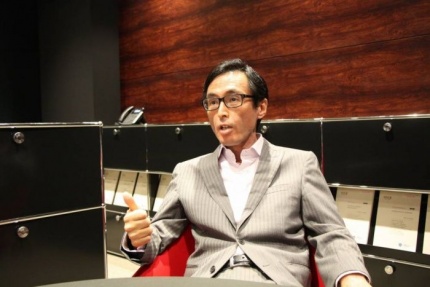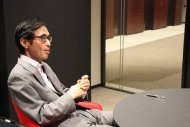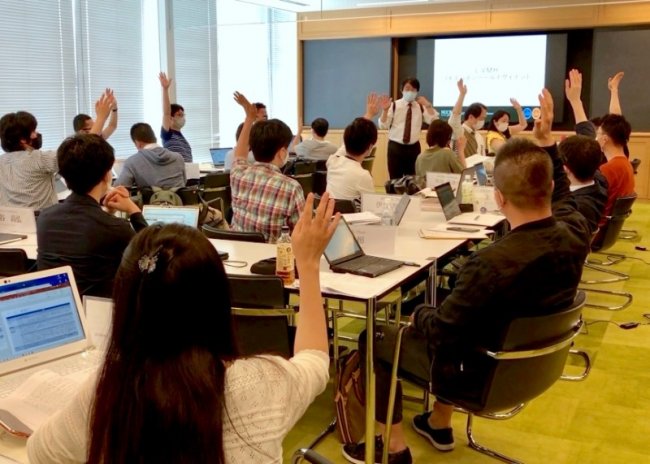Dr. Seiichiro Iwasawa, Professor, Graduate School of Management
Professor Iwasawa, who specializes in behavioral economics, is a practicing teacher who has worked as an analyst and strategist at Nomura Research Institute and Nomura Securities. Professor Iwasawa is popular among students for his light-hearted talk, and we asked him about the appeal of teaching.
Interviewed by : NUCB Business School Public Relations
Date of interview: September 2015
I love teaching and research.
Have you been teaching since you retired in 2012?
Prof. Iwasawa: Yes, that's right. I'm a full-time teacher (laughs). I teach at other schools on a part-time basis, but since 2012 I have been teaching here full-time.
What made you decide to teach?
At first, I was asked by a professor at the business school of Meiji University to teach behavioral finance. I guess I thought I would eventually quit Nomura Securities and become a teacher or researcher, so I was working part-time as a kind of preparation. I really like education and research. I especially like research. I guess that's why I wanted to work in this field.
What is the appeal of teaching?
Prof. Iwasawa: What's good about teaching is that I can get a lot of material for my research by teaching, which is also selfish.
Do you gain insights from students' opinions and perspectives?
This is closely related to my research field, but in the field of behavioral economics, conventional economics is based on an abstract model of human behavior. In the past, economics has been based on an abstract model of human behavior, a model in which people act rationally in order to make money. Of course, that's not all wrong. When money is involved, everyone is serious, so to a certain extent, people do calculations. However, if you think about yourself, you may find that you make purchases that you regret, and so on.
Behavioral economics, on the other hand, is the study of what people's behavior is from the perspective of realism. If they were all different, the study would not be possible, but there is a kind of regularity of error where everyone makes the same mistakes. It's called systematic error. The study of such errors is an important element of behavioral economics.
In behavioral economics classes, we discuss various cases and say that behavioral economics now interprets this phenomenon in this way, right? When I do this, sometimes the students don't understand what I'm talking about. They start to say things like, "In my experience," and so on. This is helpful to me. It makes me think about various things, such as whether or not the current theory is wrong. That's why I like teaching so much, and I actually listen to what everyone has to say with such interest.
In Japanese companies, managers are not trained to be managers.
Are you observing each and every student?
I'm good at observation. When the class response is weak, either the theory is wrong or I am not teaching well. So when the response is weak, it makes me think. I'm good at sensing sensitively. I think I may be quite outstanding as a Japanese male in this respect. This is also closely related to my academic work, but I think Japanese men are not very good at sensing what others are thinking. This is especially a problem for those who have become managers. In fact, managers need to be more sensitive to what their subordinates are thinking and what kind of work they want to do. They are weak in that area.
What could be causing it?
In my analysis, it is a structural problem of Japanese companies and more deeply of Japanese society. In Japanese companies, the people who are selected as managers are not necessarily the ones who have the ability to be managers. It's easy to understand if you think about professional baseball managers. For example, Mr. Hara, the manager of the Giants (at the time of the interview in September 2015), why he became a manager was because he was a good player and popular, not because he had the right skills to be a manager. That's how most managers in Japan are chosen. People who are good at sales, or who are good engineers, become managers. However, people who are good at sales are not necessarily good managers as well. On the other hand, in American and European companies, managers are hired as managers. Even for those who are hired as regular employees, their aptitude is usually assessed at a relatively early stage to see if they have the ability to become managers. In other words, there is a clear recognition there that managers need to have the skills of a manager.
The other thing is that Japanese people are not good communicators. It is very strong that people understand without saying anything. The dominant culture is to "guess". However, subordinates come from different generations, and they don't always understand by guessing. They are not accustomed to communicating with each other without using words to convey what they want to say. I hear that even Japanese couples don't talk much, and even in schools, there is no training in verbal communication. Recently, children are spending more and more time playing games, and I think it's getting worse. This is a social problem. I'm currently writing a paper on this subject, which is my research theme.

 Brochure
Brochure
 Info Session
Info Session
 Application
Application
 Alumni Voices
Alumni Voices












